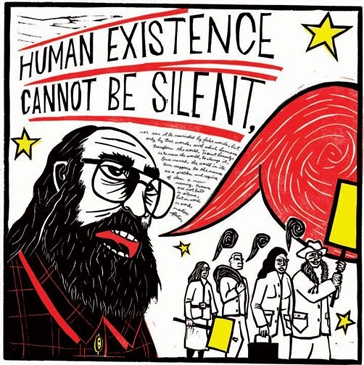 In today’s session with Karen we split into groups and started to discuss a piece of text by Freire on the 3 levels of consciousness. I find this completely fascinating and I love Freires work and agree with most of his ideas so I was excited to learn more about him. At first when my group looked at the text they were really confused and didn’t quite understand it but I understood what it meant so I decided to explain it in a way that they would understand. Most texts that we read are written in a way that makes them heavy reads and you just have to go through sentence by sentence to make sure you understand.
In today’s session with Karen we split into groups and started to discuss a piece of text by Freire on the 3 levels of consciousness. I find this completely fascinating and I love Freires work and agree with most of his ideas so I was excited to learn more about him. At first when my group looked at the text they were really confused and didn’t quite understand it but I understood what it meant so I decided to explain it in a way that they would understand. Most texts that we read are written in a way that makes them heavy reads and you just have to go through sentence by sentence to make sure you understand.
Freire says that there are 3 levels of consciousness:
- The lowest stage is called intransitive thought in which the subject believes that they cant change their life, and that fate is out of their hands and that it is a matter of luck. More religious people would believe that only god make changes in their life so they put no effort into changing things.
- The second/middle stage is semi-transitive thought where the subject is slightly empowered. They have the mind to change things but they are pessimistic and deal with problems that arise one at a time. They also naively follow strong leaders who they hope to make the change so that they don’t have to.
- The final stage is critical transitivity where the subjects demonstrate the highest level of thought and action. They believe that they themselves can make changes.
Critical consciousness can also be described as having four qualities. Power Awareness – knowing who has the power in society. Critical Literacy – having an analytic style of speaking, writing, thinking, reading and discussing and understanding deeper meaning. De-socialisation – Recognising and challenging stereotypes in society such as wealth/class, racism, sexism etc. Self Organisation/Self Education – Taking initiative to make the changes needed in an undemocratic society and overcoming the anti-intellectualism of mass education.
In terms of education in the classroom, Freires pedagogy tries to develop critical consciousness and challenge the ways of mass education. He believes that the students and the teacher need to communicate with each other and we started to discuss in the group if we feel it is possible for students and the teacher/lecturer to have the same levels of power. I suggested that its all related to context, for example when I made my suggestion, I was talking, so I had more power than the others but did I have more power than the lecturer? We also talked about how the teacher has to have more power for the education system to work and we related it to power between parents and children. Parents are teachers to their children and of course they have more power most of the time, but not always. Young people, once passed a certain age can have their own independence and in some cases for example if they are their parents carer, the young person will have the most power.
Some people in the class were shocked that some of us agreed with the idea that parents and young people can have the same power as it varies in the way you are brought up. We also began to speak about how culture and specific ethnic backgrounds affect these ideas as the girls who were of black/mixed origins were definite on the idea that the parent will always have the most power as that is the ways they were taught growing up, whilst most of those with white British origins agreed that they feel they have mutual power with their parents and respect each other. I personally feel that in a classroom situation the teacher must make sure they assert power from the beginning to set a standard but I also agree with Freires disagreement of mass education and the “banking system” (kids taking in information and not discussing it or being critical). I feel that the teacher can learn just as much from an analytical discussion with the students and it helps with the students understanding if they can discuss it.
I really enjoyed discussing Freire today as I love his ideas and his methods; I look forwards to learning more about him in the future.